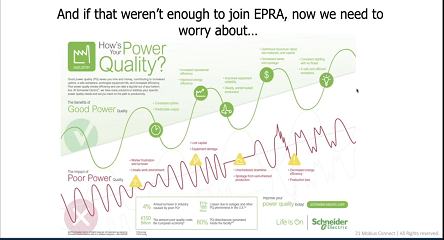When we speak about defects, we always start by thinking about Winston Ledet’s top 5:
- Defects flowing in on or with raw material
- Defects from misoperation of the asset or equipment
- Defects from Maintenance craftsmanship
- Defects from bad, counterfeit, old, or damaged spare parts and materials
- Defects from design insufficiency, mistakes in design or installation
Behind these big five are the business systems that feed information, procurement, materials, permissions, custody, and storage. For example, if a wrong but similar part is pulled for a repair, then the defect would be a bad spare. If it happens occasionally, then it is human error. But if it occurs weekly or even monthly, then the cause of the wrong spare concerns the business system that identifies, shelves, issues parts.
Crappy business systems cause cause most defects, waste and pissed-off employees
These system causes are tough to see and become so ingrained that they truly fade into the background. The defect producer becomes so intertwined with the business system and everything else that, without effort, it is invisible.
There is a trick to seeing the unseeable!
While we cannot see these systems directly, we can quickly uncover problems in them by answering some simple questions. The questioning can be done privately or in a team setting (using brainstorming or any other idea-generating technique). Note that the questions will seem oblique, but using logic, you will get a look at the performance of the underlying business system.
There are dozens of questions you could ask that would uncover defects in the business system. First, we’ll review a few of the questions. In the second section, we will breakdown the approach for one of the questions.
These questions should be answered either by data or by the opinion of the people involved. Using data versus opinion might uncover different issues. But either one can be used.
Questions to uncover hidden problems in business systems
- Complaints from operations
- Complaints from maintenance personnel
- Reasons for low worker productivity
- Specific spare parts you use the most of
- Specific spare parts that consume the most money
- % Service level (from the warehouse) by part
- % service level (from the warehouse) by work order
- Repetitive jobs (perform the job most times per year)
- Maintenance jobs you spend the most money on
- Reasons for schedule miss
- Downtime incidents sorted by cause
Of course, the initial reaction when the answer sounds like criticism is to get defensive. In this approach to get useful answers, you must adopt innocent listening. Innocent listening is listening without judgment. For a few minutes, don’t be defensive, pretend its not about you. Forget everything you know about the people, circumstances, and listen innocently.
Let’s look at some possible complaints from maintenance and operations.
Maintenance: machines are never cleaned for us, LOTO not ready, operators abuse machines, operators don’t know the first thing about the machines, never have right spare parts, don’t give up machines when scheduled for PM, no as-built drawings, crappy tools, not enough standard tools, nowhere to do benchwork, we don’t get no respect!
Again, don’t question the veracity of the answers; we operate as if they were right. Can you name the systems these complaints concern? Each complaint points to a specific breakdown in a particular business system. Not having the spare parts needed is one system, and lack of up-to-date drawings is another. These answers open up a view of reality that is fundamentally different from your normal one.
For example, one statement you might be able to make from some of the complaints is that the roles and responsibilities between maintenance and operations might not be well defined. That would give you a lack of cleaning, lack of LOTO, abuse, operators ignorant. This lack of understanding of roles can drive all kinds of defects.
Operations: Maintenance never shows up when they say, maintenance always takes longer then they promise, maintenance folks are always having coffee, standing around. I don’t see them working, they visit the machine and say they will be right back- never come back, it takes maintenance excessive time to respond, sometimes we put in a work order, and it never comes out, they don’t show us no respect.
With the operations complaints, many seem to flow from a lack of adequate planning and scheduling. No matter how good you think, your planning and scheduling are, your customers do not see it. Your customers suffer from something broken in the system. Also, why are people standing around? Is it waiting for stores? Is it waiting for a crane? Whatever systems drive what is missing and being waited for might not work.
The point of this discussion is that you can look indirectly at your systems and see evidence that there are problems. Of course, the fix requires the cooperation of all the stakeholders. That is one reason we encourage this activity to be a diverse team initiative.
As you eliminate superficial defects, you’ll find yourself turning more and more often to the business systems as the place to make improvements. Fixes of business systems can take care of a wide range of defects.


